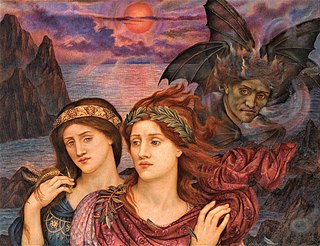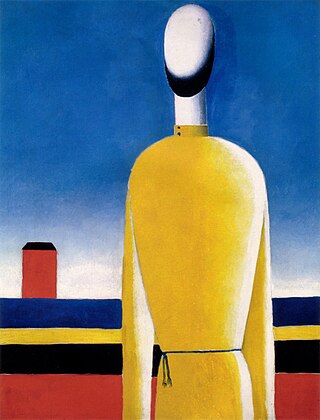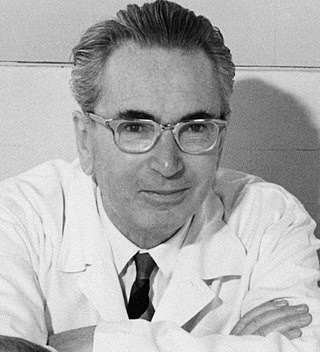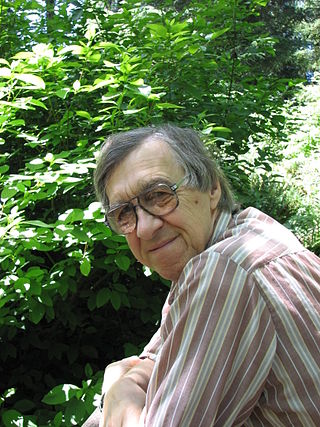Related Research Articles

Clairvoyance is the magical ability to gain information about an object, person, location, or physical event through extrasensory perception. Any person who is claimed to have such ability is said to be a clairvoyant.

Extrasensory perception or ESP, also called sixth sense, is a claimed paranormal ability pertaining to reception of information not gained through the recognized physical senses, but sensed with the mind. The term was adopted by Duke University psychologist J. B. Rhine to denote psychic abilities such as intuition, telepathy, psychometry, clairvoyance, clairaudience, clairsentience, empathy and their trans-temporal operation as precognition or retrocognition.

Parapsychology is the study of alleged psychic phenomena and other paranormal claims, for example, those related to near-death experiences, synchronicity, apparitional experiences, etc. Criticized as being a pseudoscience, the majority of mainstream scientists reject it. Parapsychology has also been criticised by mainstream critics for many of its practitioners claiming that their studies are plausible in spite of there being no convincing evidence for the existence of any psychic phenomena after more than a century of research.

Telepathy is the purported vicarious transmission of information from one person's mind to another's without using any known human sensory channels or physical interaction. The term was first coined in 1882 by the classical scholar Frederic W. H. Myers, a founder of the Society for Psychical Research (SPR), and has remained more popular than the earlier expression thought-transference.

Precognition is the purported psychic phenomenon of seeing, or otherwise becoming directly aware of, events in the future.

A ganzfeld experiment is an assessment used by parapsychologists that they contend can test for extrasensory perception (ESP) or telepathy. In these experiments, a "sender" attempts to mentally transmit an image to a "receiver" who is in a state of sensory deprivation. The receiver is normally asked to choose between a limited number of options for what the transmission was supposed to be and parapsychologists who propose that such telepathy is possible argue that rates of success above the expectation from randomness are evidence for ESP. Consistent, independent replication of ganzfeld experiments has not been achieved, and, in spite of strenuous arguments by parapsychologists to the contrary, there is no validated evidence accepted by the wider scientific community for the existence of any parapsychological phenomena. Ongoing parapsychology research using ganzfeld experiments has been criticized by independent reviewers as having the hallmarks of pseudoscience.
Remote viewing (RV) is the practice of seeking impressions about a distant or unseen subject, purportedly sensing with the mind. Typically a remote viewer is expected to give information about an object, event, person or location that is hidden from physical view and separated at some distance. Physicists Russell Targ and Harold Puthoff, parapsychology researchers at Stanford Research Institute (SRI), are generally credited with coining the term "remote viewing" to distinguish it from the closely related concept of clairvoyance. According to Targ, the term was first suggested by Ingo Swann in December 1971 during an experiment at the American Society for Psychical Research in New York City.
Paranormal events are purported phenomena described in popular culture, folk, and other non-scientific bodies of knowledge, whose existence within these contexts is described as being beyond the scope of normal scientific understanding. Notable paranormal beliefs include those that pertain to extrasensory perception, spiritualism and the pseudosciences of ghost hunting, cryptozoology, and ufology.

Viktor Emil Frankl was a Jewish-Austrian psychiatrist who founded logotherapy, a school of psychotherapy that describes a search for a life's meaning as the central human motivational force. Logotherapy is part of existential and humanistic psychology theories.

Logotherapy was developed by neurologist and psychiatrist Viktor Frankl and is based on the premise that the primary motivational force of an individual is to find a meaning in life. Frankl describes it as "the Third Viennese School of Psychotherapy" along with Freud's psychoanalysis and Adler's individual psychology.

Joseph Banks Rhine, usually known as J. B. Rhine, was an American botanist who founded parapsychology as a branch of psychology, founding the parapsychology lab at Duke University, the Journal of Parapsychology, the Foundation for Research on the Nature of Man, and the Parapsychological Association. Rhine wrote the books Extrasensory Perception and Parapsychology: Frontier Science of the Mind.

Charles T. Tart is an American psychologist and parapsychologist known for his psychological work on the nature of consciousness, as one of the founders of the field of transpersonal psychology, and for his research in parapsychology.

Eusapia Palladino was an Italian Spiritualist physical medium. She claimed extraordinary powers such as the ability to levitate tables, communicate with the dead through her spirit guide John King, and to produce other supernatural phenomena.
The American Society for Psychical Research (ASPR) is the oldest psychical research organization in the United States dedicated to parapsychology. It maintains offices and a library, in New York City, which are open to both members and the general public. The society has an open membership, anyone with an interest in psychical research is invited to join. It maintains a website; and publishes the quarterly Journal of the American Society for Psychical Research.

Eileen Jeanette Vancho Lyttle Garrett was an Irish medium and parapsychologist. Garrett's alleged psychic abilities were tested in the 1930s by Joseph Rhine and others. Rhine claimed that she had genuine psychic abilities, but subsequent studies were unable to replicate his results, and Garrett's abilities were later shown to be consistent with chance guessing. Garrett elicited controversy after the R101 crash, when she held a series of séances at the National Laboratory of Psychical Research claiming to be in contact with victims of the disaster. John Booth, and others, investigated her claims, and found them to be valueless, easily explainable, or the result of fraud.

Walter Franklin Prince was an American parapsychologist and founder of the Boston Society for Psychical Research in Boston.
In psychology, anomalistic psychology is the study of human behaviour and experience connected with what is often called the paranormal, with few assumptions made about the validity of the reported phenomena.

Extrasensory Perception is a 1934 book written by parapsychologist Joseph Banks Rhine, which discusses his research work at Duke University. Extrasensory perception is the ability to acquire information shielded from the senses, and the book was "of such a scope and of such promise as to revolutionize psychical research and to make its title literally a household phrase".

Joseph Francis Rinn (1868–1952) was an American magician and skeptic of paranormal phenomena.
Noogenic neurosis is a term in logotherapy denoting a form of neurosis stemming from "existential frustration". The term was coined by Dr. Viktor Frankl, the founder of logotherapy.
References
- ↑ Fabry, Joseph B.; Bulka, Reuven P.; Sahakian, William S. (1979). Logotherapy in Action. J. Aronson. p. 363 ISBN 978-0876683224
- ↑ James Charles Crumbaugh. Pleasants, Helene. (1964) Biographical Dictionary of Parapsychology with Directory and Glossary 1946-1996. Garrett Publications
- ↑ Alcock, James. (1981). Parapsychology-Science Or Magic?: A Psychological Perspective. Pergamon Press. 136. ISBN 978-0080257730
- ↑ Hines, Terence. (2003). Pseudoscience and the Paranormal. Prometheus Books. p. 117. ISBN 978-1573929790